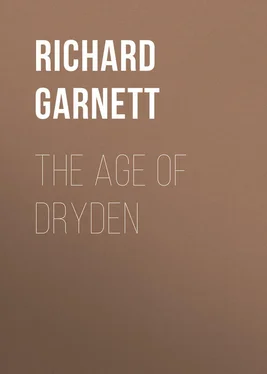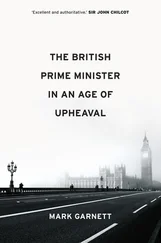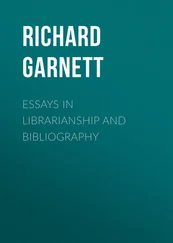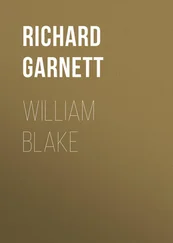Richard Garnett - The Age of Dryden
Здесь есть возможность читать онлайн «Richard Garnett - The Age of Dryden» — ознакомительный отрывок электронной книги совершенно бесплатно, а после прочтения отрывка купить полную версию. В некоторых случаях можно слушать аудио, скачать через торрент в формате fb2 и присутствует краткое содержание. Жанр: foreign_antique, foreign_prose, на английском языке. Описание произведения, (предисловие) а так же отзывы посетителей доступны на портале библиотеки ЛибКат.
- Название:The Age of Dryden
- Автор:
- Жанр:
- Год:неизвестен
- ISBN:нет данных
- Рейтинг книги:4 / 5. Голосов: 1
-
Избранное:Добавить в избранное
- Отзывы:
-
Ваша оценка:
- 80
- 1
- 2
- 3
- 4
- 5
The Age of Dryden: краткое содержание, описание и аннотация
Предлагаем к чтению аннотацию, описание, краткое содержание или предисловие (зависит от того, что написал сам автор книги «The Age of Dryden»). Если вы не нашли необходимую информацию о книге — напишите в комментариях, мы постараемся отыскать её.
The Age of Dryden — читать онлайн ознакомительный отрывок
Ниже представлен текст книги, разбитый по страницам. Система сохранения места последней прочитанной страницы, позволяет с удобством читать онлайн бесплатно книгу «The Age of Dryden», без необходимости каждый раз заново искать на чём Вы остановились. Поставьте закладку, и сможете в любой момент перейти на страницу, на которой закончили чтение.
Интервал:
Закладка:
‘These wonderful verses,’ says Mr. Palgrave of the entire poem, ‘may be regarded as a test of any reader’s insight into the most poetical aspects of poetry.’
As a satirist it is Marvell’s error to confound satire with lampoon. He has the saeva indignatio which makes the avenger, but spends too much of it upon individuals. Occasionally some fine personification gives promise of better things, but the poet soon relapses into mere personalities. This may be attributed in great measure to the circumstances under which these compositions appeared. They could only be circulated clandestinely, and the writer may be excused if he did not labour to exalt what he himself regarded as mere fugitive poetry. The most celebrated of these pieces are the series of Advices to a Painter , in which the persons and events of the day are described to an imaginary artist for delineation in fitting, and therefore by no means flattering, colours. It is to Marvell’s honour that he succeeds best with a fine subject. When, in his poems on the events of the Commonwealth, he escapes from mere sarcasm and negation, and speaks nobly upon really noble themes, he soars far above the Marvell of the Restoration, though even here his verse is marred by lapses into the commonplace, and by his besetting infirmity of an inability to finish with effect, leaving off like a speaker who sits down rather from the failure of his voice than the exhaustion of his theme. The panegyric on Cromwell’s anniversary, and the poem on his death, abound nevertheless with fine, though faulty passages, of which the following may serve as an example:
‘O human glory vain! O Death! O wings!
O worthless world! O transitory things!
Yet dwelt that greatness in his shape decayed,
That still, though dead, greater than death he laid,
And in his altered face you something feign
That threatens Death he yet will live again.
Not much unlike the sacred oak which shoots
To heaven its branches, and through earth its roots,
Whose spacious boughs are hung with trophies round,
And honoured wreaths have oft the victor crowned,
When angry Jove darts lightning through the air
At mortal sins, nor his own plant will spare,
It groans and bruises all below, that stood
So many years the shelter of the wood.
The tree, erewhile foreshortened to our view,
When fallen shows taller yet than as it grew;
So shall his praise to after times increase,
When truth shall be allowed, and faction cease;
And his own shadows with him fall; the eye
Detracts from objects than itself more high;
But when Death takes from them that envied state,
Seeing how little, we confess how great.’
Marvell’s position as the satirist of his era from the Puritan and Republican point of view, was filled upon the Cavalier side by Samuel Butler, who, if general reputation and excellence in his own walk of verse are to be allowed as criterions, may claim to be the third poet of the age after Milton and Dryden. It is true that Butler, though endowed with abundance of fancy, was, strictly speaking, no poet; that he is entirely destitute of the dignity and tenderness which Marvell can display with a congenial theme; and that he possesses nothing of Dryden’s power of exalting unpromising subjects into poetry. But he infinitely surpasses Marvell when they meet on the common ground of satire; and though he cannot be said to surpass Dryden, their methods are so different that no proper comparison can be drawn. When writing in Dryden’s manner Butler is respectable, but he has the field of burlesque epic entirely to himself. Supremacy in a low style of composition is a surer passport to fame than moderate merit in a high one. With all the defects of Restoration literature, it had a faculty for producing masterpieces, and it must be admitted that Butler’s Hudibras stands as decidedly at the head of its class as Paradise Lost , or Absalom and Achitophel , or Pilgrim’s Progress , or Pepys’s Diary at the head of theirs.
Samuel Butler (1612-1680).
Samuel Butler was born near Worcester in 1612. His father, a small farmer, procured him a good education at the Worcester Grammar School. His first employment was that of clerk to a country justice named Jefferys. He afterwards entered the household of Elizabeth, Countess of Kent, at Wrest, in Bedfordshire, and subsequently acted as clerk to various justices of the peace, one of whom, Sir Samuel Luke, of Cople Hoo, near Bedford, served as the original of Hudibras. It is curious to reflect that John Bunyan was at the same time going through his spiritual conflicts in the same county. He seems to have also travelled in France and Holland. He published nothing until 1659, when an anonymous tract in favour of the restoration of the monarchy, entitled Mola Asinaria , appeared from his pen. The service was recompensed by the appointment of secretary to the Earl of Carbury, Lord President of Wales, who made him steward of Ludlow Castle, where Comus had been performed nearly thirty years before. He resigned this charge upon contracting what seemed a wealthy marriage, but the lady’s money was lost, and, notwithstanding the great literary success Hudibras , the remainder of the author’s life was spent in poverty. The first part of Hudibras , stated in the title to have been written during the Civil War, and if so at least fifteen years old, was published in 1663. Its success was instantaneous, though neither the Puritans nor Mr. Pepys could quite see the joke. The merit of the performance, however, was fully apparent to a better and more influential judge, the king, who encouraged the author by giving numerous copies away, though history does not say at whose expense. But this was all he gave, and the poet who had rendered such essential service to the royalist cause by his writings was as completely neglected by the Court as if he had been John Milton. It is indeed said that he was in receipt of a pension of £100 at his death; but this seems contradicted by the letter, already quoted, of Dryden to the Lord High Treasurer within two years after Butler’s death, where he says: ‘’Tis enough for one age to have neglected Mr. Cowley and starved Mr. Butler.’ 5 5 Mr. Churton Collins, by a clerical error, prints Waller .
Oldham’s lines, written at the same time, are still more emphatic:
‘On Butler who can think without just rage,
The glory and the scandal of the age?
Fair stood his hopes when first he came to town,
Met everywhere with welcomes of renown,
Courted and loved by all, with wonder read,
And promises of princely favour fed;
But what reward for all had he at last,
After a life of dull expectance passed?
The wretch at summing up his misspent days
Found nothing left but poverty and praise;
Of all his gains by verse he could not save
Enough to purchase flannel and a grave;
Reduced to want, he in due time fell sick,
Was fain to die, and be interred on tick;
And well might bless the fever that was sent
To rid him hence, and his worse fate prevent.’
These spirited verses are certainly exaggerated. Butler, though, as his biographer says, ‘personally known to few,’ partook on the same authority of the munificence of Dorset, and dying on September 25th, 1680, was buried on September 27th in the churchyard of St. Paul’s, Covent Garden, at the expense of another friend, William Longueville, bencher of the Inner Temple, who had previously endeavoured to obtain his interment in Westminster Abbey, where, Atterbury being dean, a tardy monument was erected to him in 1721 by Alderman Barber. Very little is known of the latter years of his life, except that he lived in Rose Street, Covent Garden, and that he suffered much from the gout. He had published a second part of Hudibras in 1664, and a third in 1678, containing many allusions to events much later than the Civil War. He bequeathed his posthumous papers to Longueville, by whom they were carefully preserved, and a large portion eventually came to be published in 1759. They will be treated of in another place. Not much is known of Butler’s personal character and habits. He must evidently have been a man of extensive reading, and versed in several languages and literatures. It seems natural to attribute the neglect of so popular an author to some infirmity in his own temper, but the little testimony we have makes the other way. Wood describes him as ‘a boon and witty companion;’ and Aubrey says, ‘A severe and sound judgment, a good fellow.’ It must be remembered that he was forty-eight at the Restoration, and had spent almost all his life in the country; we shall also find reason to believe that he was neither enough of a churchman nor enough of a loyalist to be entirely agreeable to his own party.
Читать дальшеИнтервал:
Закладка:
Похожие книги на «The Age of Dryden»
Представляем Вашему вниманию похожие книги на «The Age of Dryden» списком для выбора. Мы отобрали схожую по названию и смыслу литературу в надежде предоставить читателям больше вариантов отыскать новые, интересные, ещё непрочитанные произведения.
Обсуждение, отзывы о книге «The Age of Dryden» и просто собственные мнения читателей. Оставьте ваши комментарии, напишите, что Вы думаете о произведении, его смысле или главных героях. Укажите что конкретно понравилось, а что нет, и почему Вы так считаете.












